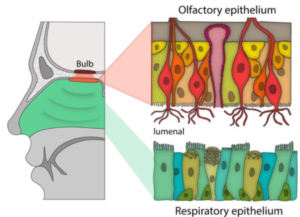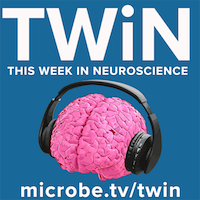
Bob Datta joins TWiN to reveal the findings of his laboratory on expression of SARS-CoV-2 entry genes in the olfactory epithelium and the implications for anosmia associated with COVID-19.
Hosts: Ori Lieberman, Andres Bendesky, Jason Shepherd, Erin Calipari and Vincent Racaniello
Guest: Bob Datta
Click arrow to play
Download TWiN 005 (36 MB .mp3, 59 min)
Subscribe (free): iTunes, Google Podcasts, RSS, email
Become a patron of TWiN!
Links for this episode
- Expression of SARS-CoV-2 entry genes in nasal olfactory epithelium (bioRxiv) 26:10
- SARS-CoV-2 entry genes in human olfactory neuroepithelium (bioRxiv) 52:23
- Timestamps by Jolene. Thanks!
Intro music is by Ronald Jenkees.
Send your neuroscience questions and comments to twin@microbe.tv


I live in Madrid, Spain in an area that has been a hotbed for SARS-CoV-2 contagion. I have kept confined all this time, but my girlfriend has to go to work, so I am not isolated.
I have only had one real symptom: 2 days complete anosmia. I couldn’t even smell vips vaporub with my nose inside the jar. I normally have a keen sense of smell and this was a very weird experience. After two days of sudden and total blackout (I smell my coffee every morning and one day it wasn’t there), I got back to maybe 50% and then gradually up to (3 weeks later) maybe 80%. I don’t know what I had since I don’t have access to a test of any kind. In any case I thought you’d find this interesting.
I love all your podcasts (specially TWIV). Keep on the good work.
Reminds me a bit of what I tend to study pathogenic fungi and ameoba! They often cause loss of smell before showing CNS symptoms as the enter through nasal epithelium or smell fibers